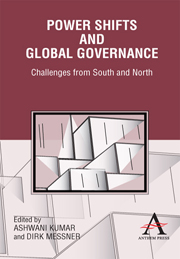Book contents
- Frontmatter
- Contents
- List of Contributors
- Foreword
- Power Shifts and Global Governance
- Part One Theoretical and Analytical Reflections on Global Governance
- Part Two Power Shifts, Regional Experiences and Global Challenges
- 7 Global Power Shifts and South Africa's Southern Agenda: Caught between African Solidarity and Regional Leadership
- 8 Mexico as an Emerging Power in the Present World Scenario: Global Economy without National Development Strategy?
- 9 Trilateral Relations among Africa, China and Europe: A Chinese Perspective
- 10 South America and US Relations: Implications for Regional Security
- 11 The Future Developments in Global Governance – Multilateralism & Regionalization Process: India's Role
- 12 Managing Social Issues for Sustainable Development: The Indian Experiences
- Part Three Case Studies in Global Governance
- Notes
11 - The Future Developments in Global Governance – Multilateralism & Regionalization Process: India's Role
from Part Two - Power Shifts, Regional Experiences and Global Challenges
Published online by Cambridge University Press: 05 March 2012
- Frontmatter
- Contents
- List of Contributors
- Foreword
- Power Shifts and Global Governance
- Part One Theoretical and Analytical Reflections on Global Governance
- Part Two Power Shifts, Regional Experiences and Global Challenges
- 7 Global Power Shifts and South Africa's Southern Agenda: Caught between African Solidarity and Regional Leadership
- 8 Mexico as an Emerging Power in the Present World Scenario: Global Economy without National Development Strategy?
- 9 Trilateral Relations among Africa, China and Europe: A Chinese Perspective
- 10 South America and US Relations: Implications for Regional Security
- 11 The Future Developments in Global Governance – Multilateralism & Regionalization Process: India's Role
- 12 Managing Social Issues for Sustainable Development: The Indian Experiences
- Part Three Case Studies in Global Governance
- Notes
Summary
The pursuit of the global common good is the core challenge for all concerned with governance today. It is a responsibility shared by different actors viz. individuals and companies, as well as states and their leaders who are motivated chiefly by their own specific interests. In the future world of globalization, mankind will need to accept new values in order to alleviate the plight of the poor.
Global economic interdependence has grown significantly. This development, generally called globalization, is the consequence of enormous technological progress and the determination, demonstrated by political decisions, to open national economies internally and externally to competition. This process is bound to continue. Thus far, globalization has brought improvements and opportunities for many people in many parts of the world. However, many have not been able to adapt to it and thus were excluded from its benefits. Consequently, they are disadvantaged. Globalization makes it possible to enjoy the experience of encountering a world of diversity and greater efficiency, but it raises fears about the loss of cultural identity. Global governance is the key to ensure that the positive impacts of globalization are enhanced and that its potentially negative effects are diminished.
Whilst economic interdependence has been reinforced in recent years, the absolute number of very poor people has grown worldwide. Material inequality between countries and within countries has also increased. The world now requires a coherent approach to reduce poverty and inequality.
- Type
- Chapter
- Information
- Power Shifts and Global GovernanceChallenges from South and North, pp. 203 - 220Publisher: Anthem PressPrint publication year: 2010
- 1
- Cited by

